Share
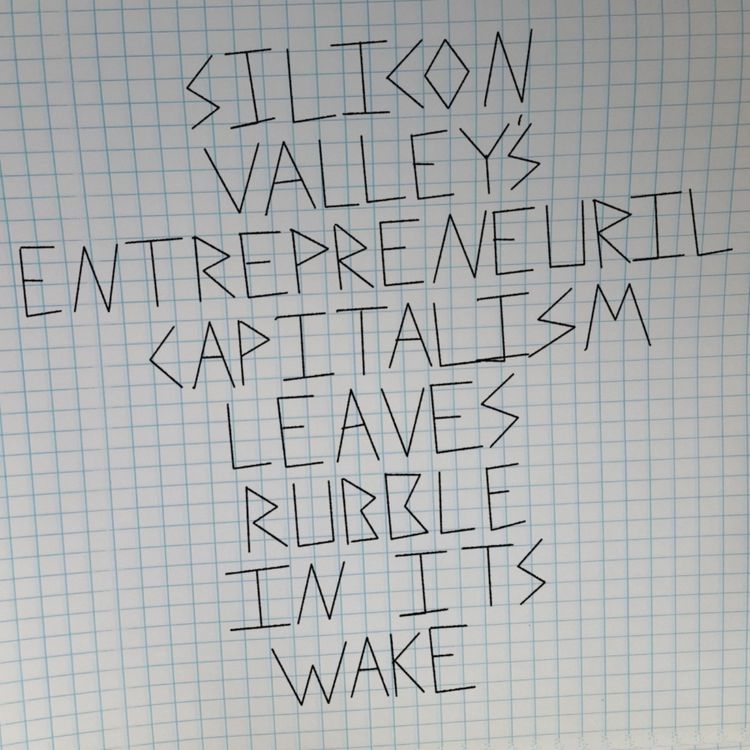
We Need Gentle Truths for Now
Silicon Valley’s Entrepreneurial Capitalism Leaves Rubble in its Wake
For this episode, we consider the relations between digital tools, their corporate overlords, and the power we retain in our own bodies. We will hear a beautiful uncoiling of ideas between Natalie Bookchin, a media artist based in New York, and Molly Astley, a British artist and writer. Together they will consider HardTruth Number 59: “silicon valley’s entrepreneurial capitalism leaves rubble in its wake.” It was written by Natalie in 2017 for my online primmer on digital media literacy. Molly is graduate of the University of Sussex in Brighton, England, where she studied creative and critical writing. She attended a Fake News Poetry Workshop at the university in 2018. Molly responded to and extended Natalie’s ideas about Silicon Valley inspired instability and resultant rubble with a poem of her own:
do not be distracted from the truth
that you make with your own body.
Later, During COVID-19, she recorded a reflection about how her ideas had altered as she considered more writing that had been generated since by her poem at later Workshops, particularly the line: “tectonic assurance in fragile ground.” These engagements demonstrate how the chilling relations between capitalism, freedom, networks, and sustainability can be understood through our bodies, as well as the poems and truths through which we render our knowledge.
.........................
When we are socially distanced, we are more and less dependent on our bodies and earth. We move content and processes online where we invite you to also live and know the internet differently, by engaging. Read or respond to a poem or hardtruth found at the online primer of digital media literacy, #100hardtruths-#fakenews or fakenews-poetry.org.
Organize your own Fake News Poetry Workshop.
Reach out with questions or content @ 100hardtruths@gmail.com.
Twitter: @100HardTruths
Instagram: @100HardTruths
YouTube: 100 Hard Truths
More episodes
View all episodes

18. The Beauty of Weirdos
06:26||Season 1, Ep. 18Our final episode highlights two things: the beauty of weirdos & your human hope. Project organizer, Professor Alexandra Juhasz, penned these fragments, anonymously, at a Fake News Poetry Workshop held at the Toronto home of that workshop’s facilitator, Professor T.L. Cowan. Later, at another workshop held within an NYU Performative Writing class and led by Professor Barbara Browning, these words were transformed into a song—by Barbara—quite unaware of who had written them. Two fragments of poetry formed a crossroads between T.L., Barbara, Alex, and others. And, the gifts of time, thought, place, art, and care—so live in this episode—also allow it to model HardTruth #23 from the online primer on digital media literacy: "galvanize people at the crossroads of cinema and community." These words were originally penned by The United States of Cinema, a collective that organized a National Event Day in April 2017. The movie 1984 was screened across the U.S, as a way to speak against fake news, totalitarian rule, and censorship. At the intersections of moving images, artmaking, and ways of being together, we can and often do manifest power and hope. Poetry, songs, performances, movies, parties, and workshops are places where truth intersects with our knowledge, disdain, and plans for each other and the internet. This podcast has been another crossroads for people, poetry, community, criticism, activism and care. The generous, volunteer contributions of scores of poets, scholars, and activists allowed for the many connections that have been built here in the summer of 2020. The stellar efforts of director and editor, Matthew Hittle, social media specialist, Julia Gill, and copyeditor, Gavin McCormick have provided the steady pulse that underwrote and enabled it all. Thank you for listening!Twitter: @100HardTruthsInstagram: @100HardTruthsYouTube: 100 Hard Truths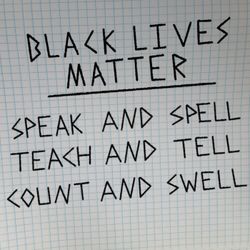
17. Black Lives Matter - Speak and Spell, Teach and Tell, Count and Swell
17:39||Season 1, Ep. 17This emergency episode was made quickly during a time of uprising following the killing of George Floyd, Ahmaud Arbery, Breonna Taylor, Tony McDade, and countless other African Americans by police.Poets, educators, and friends Chet’la Sebree and Margaret Rhee worked with me on two Fake News Poetry workshops on race and the media. The first was in May 2018, with poets of color in Brooklyn; the second, in November at the home of Claudia Rankine and John Lucas, where we translated some of the poems written in Brooklyn into video-poems.Now, in a new moment of insurrection and distance, they reflect upon poetry, media, race, safety, and beauty. Each shares a poem. Then they speak together. “How do we render humanity?” Chet’la asks Margaret. By co-articulating, gently and powerfully, the relations between place, politics, poetry, and power.In so doing, my colleagues also enact the #100th, and final, HardTruth from my online primmer, a call to poetry: “speak and spell, teach and tell, count and swell.” These simple rhymes set forth the hard ideas and warm feelings that unroll here, spoken with intimacy and care by two women of color poets and teachers. Speak and spell about love. Teach and tell about friendship. Count and swell our writing and conversation in a time of continuing distance and proximity, all in honor of a very simple truth: Black Lives Matter.Join us in the change!Reach out with questions or content @ 100hardtruths@gmail.com.Twitter: @100HardTruthsInstagram: #100HardTruthsYouTube: 100 Hard Truths#BlackLivesMatter
16. Resist How We Are Framed
08:22||Season 1, Ep. 16In this episode, we rely on poetry to resist how we are framed. A HardTruth of the same name was written for my online primmer on digital media literacy by the writer Hugh Ryan. In 2017 he offered up words of our queer heritage as one response to the dishonorable and controlling vernaculars of the internet.Hugh believes that we are “hampered because we fight using language that is stacked against us.”So, he provides something else, the poetry and wisdom of our elders. Adrienne Rich, David Wojnarowicz, and Audre Lorde. Three young people in my family read selections of their writing, learning and reading with us and from our elders. The episode ends with Hugh’s reading of Lenin D’s poem written at a Fake News Poetry workshop with the disabled writer’s troupe, Poets of Course: one more voice, or is that two, in a noble legacy of frame-breakers we have listened to and learned from here:I felt I was in the moment of silence because I was shy, a little bit socialand my identity has been changing for the better and worst of me.I was never rejected not because I have a disability,I just didn't want to talk to people in high school.Poems teach, and in so doing prove that art-making, connected to our experiences of identity, community, family, disability, and truth, can be one small part of a shared way out of, or perhaps through, our terrible troubles. So, change the internet with us! Engage in art answers to phony questions by volunteering to read a poem, a HardTruth, or your own response. Organize your own Fake News Poetry Workshop.Reach out with questions or content @100hardtruths@gmail.comTwitter: @100HardTruthsInstagram: @100HardTruthsYouTube: 100 Hard Truths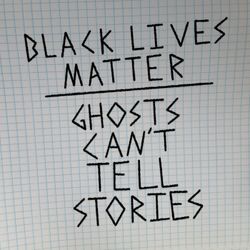
15. Black Lives Matter - Ghosts Can't Tell Stories
19:02||Season 1, Ep. 15This emergency episode was made quickly during a time of uprising following the killing of George Floyd, Ahmaud Arbery, Breonna Taylor, Tony McDade, and countless other African Americans by police.We hear readings of “A Small Needful Fact” by Ross Gay. perhaps, in all likelihood,he put gently into the earthsome plants which, most likely,some of them, in all likelihood,continue to grow, continueto do what such plants doFellow-AIDS scholars, Drs. Jih-Fei Cheng and Nishant Shahani (co-editors with me of the book AIDS and the Distribution of Crises, Duke 2020) make resonant connections between ecology, blackness, strength, and violence. How plants, earth, and seeds center rather than scatter us. This reminds Nishant of the daily bounties of the earth, the mundane and sustaining connection to the food we grow and eat, another poem: Eve Ewing’s “I saw Emmett Till this week at the grocery store.” The histories of violence written into plants and fruit—seeds, tobacco, and viruses—and attendant histories of pleasure, labor, medicine, and colonial and global capitalist theft will then focus Jih-Fei’s reflections, also borne from poetry and protest.Eric Garner and Emmet Till were silenced by violence. But their stories persist -- voluminous, angry, peaceful, and mundane -- through the words of poets and critics. In this way, we connect to the hardtruth #69 written for the online primer on digital media literacy, “ghosts can’t tell stories” by Quito Zeigler. Poems are not a solution but rather an invitation and an invocation to act and do a little differently, perhaps as plants do: help us breathe so we can engage together to better the internet and ourselves. Join us in the change! Read or respond to a poem or hardtruth found at the online primer of digital media literacy, #100hardtruths-#fakenews or fakenews-poetry.org.To read Jih-Fei and Nishant's full pieces of writing on which this episode relies, please see "Following A Small Needful Fact," by Jih-Fei Cheng and "Thinking about Small, Needful Facts," by Nishant Shahani on the Duke University Press blog: Dispatches on AIDS and COVID-19: Continuing Conversations from AIDS and the Distribution of Crises (Dispatch Three).Organize your own Fake News Poetry Workshop.Reach out with questions or content @ 100hardtruths@gmail.com.Twitter: @100HardTruthsInstagram: #100HardTruthsYouTube: 100 Hard Truths#BlackLivesMatter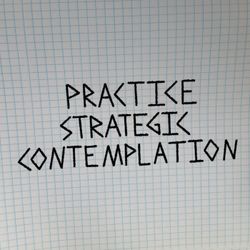
14. Practice Strategic Contemplation
14:51||Season 1, Ep. 14This episode highlights methods to “practice strategic contemplation,” the 16th HardTruth for my online primer on digital media literacy. This is one of six “principles of feminist filmmaking” represented in Alexandra Hidalgo’s video book, Cámara Retórica: A Feminist Filmmaking Methodology for Rhetoric and Composition. Hidalgo is an award-winning Venezuelan filmmaker, theorist, and editor. These methods of attention to and care for others, the self, and the world inspired connections across the project, which will form the words and methods of this episode.The very first Fake News Poetry Workshop was held at the Ammerman Center 16th Biennial Symposium on Arts & Technology. It was co-led by Kyle Booten, a poet, digital scholar, and programmer. We worked with participants to generate forms and methods that might improve our engagements with the world and social media. Kyle called these psychotechnologies of care. Lisa Moren and Maro Perez wrote one of many poems that took the form of scripts, or algorithms, that could regulate, or better yet, open out to others our attention. Their words had been inspired by Alexandra’s. We seek such tender connections.Practice Strategic Contemplation1. create a list of activities (with an alarm) to go off every 5 minutes for 2 hours2. Go for a walk3. Observe the truth of your surroundings4. Allow for associations that relate to your observations and record during or after walk5. If vibrations occur, then answer phone and follow your own prompt6. Forget Associations7. Repeat until two hours are upThe episode ends with a poem that I wrote with my boyfriend and project participant, Gavin McCormick, as we follow this script through the streets of Brooklyn. Take a walk. Write a poem. Change the internet by writing yourself and others with attention. Or volunteer to read a poem or hardtruth found at the online primer of digital media literacy, #100hardtruths-#fakenews or fakenews-poetry.org.Organize your own Fake News Poetry Workshop.Reach out with questions or content @ 100hardtruths@gmail.com.Twitter: @100HardTruthsInstagram: @100HardTruthsYouTube: 100 Hard Truths
13. Black Lives Matter - African American History is Real - Peace is the Most Powerful Deterrent of All
12:17||Season 1, Ep. 13This emergency episode was made quickly during a time of uprising following the killing of George Floyd, Ahmaud Arbery, Breonna Taylor, Tony McDade, and countless other African Americans by police.We begin by hearing “Credo,” a prose poem first written by W.E.B. DuBois in 1904. The version we will hear was conceived and produced by Dr. John Michael Cooper. It is a compilation of 36 voices reading from DuBois' proclamation on his philosophy of racial equality. This is a digital method to embody and share the truth that Black Lives Matter now, that Black voices speak truth to power with their poetry and music, and that all Americans can be moved and changed through a justice-focused interlocking of art, education, activism, and pride. Dr. Cooper mixes diverse and impassioned voices recorded for this project over the summer of 2020.He intercuts music written for the Credo by African-American composer Margaret Bonds, allowing us to hear for ourselves the hardtruth #36: African American History is real.History feeds us in today’s struggles. This episode’s shared voicing of a call for justice also aligns with the project’s hardtruth, #98, that “peace can be the most powerful deterrent of all.”DuBois writes: “I believe that armies and navies are at bottom the tinsel and braggadocia of oppression and wrong; and I believe that the wicked conquest of weaker and darker nations by nations whiter and stronger but foreshadows the death of that strength.”Agree? Join us in the change!.........................This emergency episode was made quickly during a time of uprising following the killing of George Floyd, Ahmaud Arbery, Breonna Taylor, Tony McDade, and countless other African Americans by police. We begin by hearing “Credo,” a prose poem written by W.E.B. DuBois in 1904 in which he outlines his philosophy on racial equality. This version, a compilation of 36 diverse voices reading from DuBois’ proclamation, was conceived and produced in the summer of 2020 by Dr. John Michael Cooper. This is a digital method to embody and share the truth that Black Lives Matter now; that Black voices speak truth to power with poetry and music; and that all Americans can be moved and changed through a justice-focused interlocking of art, education, activism, and pride. Cooper intercuts two pieces of music: original music written in imitation of the setting of the “Credo” by African-American composer Margaret Bonds, along with African-American composer Florence Price's arrangement of the spiritual “Some of These Days.” This allow us to hear as score and prose the project’s HardTruth #36: “African American History is real.” History feeds us in today’s struggles. This episode’s shared voicing of a call for justice also aligns with HardTruth #98: “peace can be the most powerful deterrent of all.” DuBois writes: “I believe that armies and navies are at bottom the tinsel and braggadocia of oppression and wrong; and I believe that the wicked conquest of weaker and darker nations by nations whiter and stronger but foreshadows the death of that strength.” Agree? Join us in the change! (For more HardTruths about African American history and the long struggle for freedom, please also see: #40, challenge the narrative of (African) American progress about the art of Edgar Arceneaux, and #56, subversion through grinning; learn truths from radical black artists who lived through civil rights written by filmmaker Stephen Winter.).........................To learn more about DuBois, the Credo, Bonds, and Dr. Cooper’s work on these subjects, please visit his blog: https://cooperm55.wixsite.com/jmc3/post/testimony Read or respond to a poem or hardtruth found at the online primer of digital media literacy, #100hardtruths-#fakenews or fakenews-poetry.org. Organize your own Fake News Poetry Workshop.Reach out with questions or content @100hardtruths@gmail.com.Twitter: @100HardTruthsInstagram: #100HardTruthsYouTube: 100 Hard Truths#BlackLivesMatter
12. Choose to be Digitally Productive Rather than Reactive
08:54||Season 1, Ep. 12For this episode, In this episode, we focus on the founding illogics of online response and inaction, distancing and touching, by taking up the internet formats at the heart of what ails us. We will hear a reading of some of Alexandra Juhasz's more self-critical writing, “choose to be digitally productive rather than reactive,” a response to feeling dirty, grim, and culpable on the 55th day of creating her online primmer. Then, video artist Orr Menirom joins the conversation, reading and also explaining the process behind a poem written at a Fake News Poetry Workshop held at a Media Studies Conference in NYC and created through a surrealist process called Exquisite Corpse. Like us, the surrealists were responding to the phony questions of their time--about war, nationalism, racism, and capitalism. They chose to bank on the qualities of the irrational, unconscious, or random—as well as the collective. We borrowed these tactics, and the poems rendered through them allow us real access to today’s truths.the problem now with the internet is that the past is always there… as you grow up you are going tochangelivesForeveroceans are drowning in plastic.........................We know neither podcasts nor Fake News Poetry Workshops will end or even undo the internet’s current shape or violence, nor the insane logics of our time that litter our oceans with plastic. But they do offer other productive systems from which we can learn and do differently. So, change the internet with us! Engage in art answers to phony questions by volunteering to read a poem or hardtruth found at the online primer of digital media literacy, #100hardtruths-#fakenews or fakenews-poetry.org.Organize your own Fake News Poetry Workshop.Reach out with questions or content @ 100hardtruths@gmail.com.Twitter: @100HardTruthsInstagram: @100HardTruthsYouTube: 100 Hard Truths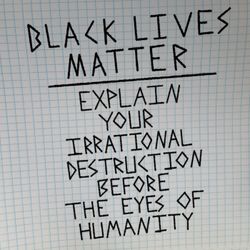
11. Black Lives Matter - Explain Your Irrational Destruction before the Eyes of Humanity
19:30||Season 1, Ep. 11This emergency episode was made quickly during a time of uprising following the killing of George Floyd, Ahmaud Arbery, Breonna Taylor, Tony McDade and countless other African Americans by police.We begin by hearing “Innocence Nevermore,” a short video made by Frances Negron-Muntaner featuring Nuyorican poetry legend “Tato” Livaiera performing his poem “Innocence (to 9/11)” with gifted musician Tato Torres. Locked in her archives for 16 years, this footage would be transformed into her contribution to the Visible Poetry Project in 2017. This video also became the 82nd HardTruth of my online primmer, pulling words and knowledge straight from Livaiera’s poem: “explain your irrational destruction before the eyes of humanity.” Frances discusses the physical, emotional, imaginative infrastructures we need to decolonize ourselves and our country. Poetry is part of this, helping us articulate and create new realities, new vocabularies, and new ways of being in community..........................Join us in the change!Read or respond to a poem or hardtruth found at the online primer of digital media literacy, #100hardtruths-#fakenews or fakenews-poetry.org.Organize your own Fake News Poetry Workshop.Reach out with questions or content @ 100hardtruths@gmail.com.Twitter: @100HardTruthsInstagram: #100HardTruthsYouTube: 100 Hard Truths#BlackLivesMatter